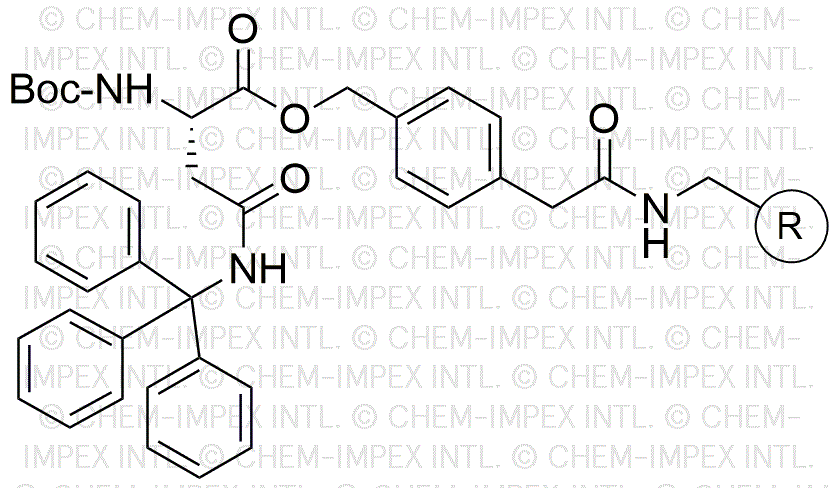Na-Boc-Ng-trityl-L-asparagine 4-oxymethylphenylacetamidomethyl resin is widely utilized in research focused on:
- Peptide Synthesis: This resin is commonly used in solid-phase peptide synthesis, allowing researchers to efficiently create complex peptides with high purity and yield.
- Bioconjugation: It serves as a valuable tool for attaching biomolecules to surfaces or other molecules, enhancing the development of targeted drug delivery systems.
- Protein Engineering: The resin facilitates the modification of proteins, enabling scientists to study structure-function relationships and develop novel protein-based therapeutics.
- Analytical Chemistry: It aids in the purification and analysis of peptides and proteins, providing a reliable method for obtaining high-quality samples for further study.
- Drug Development: This compound plays a role in the design of new pharmaceuticals, particularly in the creation of peptide-based drugs that can target specific diseases.
Informations générales
Propriétés
Sécurité et réglementation
Applications
Na-Boc-Ng-trityl-L-asparagine 4-oxymethylphenylacetamidomethyl resin is widely utilized in research focused on:
- Peptide Synthesis: This resin is commonly used in solid-phase peptide synthesis, allowing researchers to efficiently create complex peptides with high purity and yield.
- Bioconjugation: It serves as a valuable tool for attaching biomolecules to surfaces or other molecules, enhancing the development of targeted drug delivery systems.
- Protein Engineering: The resin facilitates the modification of proteins, enabling scientists to study structure-function relationships and develop novel protein-based therapeutics.
- Analytical Chemistry: It aids in the purification and analysis of peptides and proteins, providing a reliable method for obtaining high-quality samples for further study.
- Drug Development: This compound plays a role in the design of new pharmaceuticals, particularly in the creation of peptide-based drugs that can target specific diseases.
Documents
Fiches de données de sécurité (FDS)
La FDS fournit des informations de sécurité complètes sur la manipulation, le stockage et l’élimination du produit.
Spécifications du produit (PS)
Le PS fournit une description complète des propriétés du produit, notamment sa composition chimique, son état physique, sa pureté et les exigences de stockage. Il détaille également les plages de qualité acceptables et les applications prévues du produit.
Certificats d'analyse (COA)
Recherchez des certificats d'analyse (COA) en saisissant le numéro de lot du produit. Les numéros de lot et de lot se trouvent sur l'étiquette d'un produit, après les mots « Lot » ou « Lot de fabrication ».
Numéro de catalogue
Numéro de lot/série
Certificats d'origine (COO)
Ce certificat d'exploitation confirme le pays dans lequel le produit a été fabriqué, et détaille également les matériaux et composants utilisés et s'il est issu de sources naturelles, synthétiques ou autres sources spécifiques. Ce certificat peut être requis pour les douanes, le commerce et la conformité réglementaire.
Numéro de catalogue
Numéro de lot/série
Fiches de données de sécurité (FDS)
La FDS fournit des informations de sécurité complètes sur la manipulation, le stockage et l’élimination du produit.
DownloadSpécifications du produit (PS)
Le PS fournit une description complète des propriétés du produit, notamment sa composition chimique, son état physique, sa pureté et les exigences de stockage. Il détaille également les plages de qualité acceptables et les applications prévues du produit.
DownloadCertificats d'analyse (COA)
Recherchez des certificats d'analyse (COA) en saisissant le numéro de lot du produit. Les numéros de lot et de lot se trouvent sur l'étiquette d'un produit, après les mots « Lot » ou « Lot de fabrication ».
Numéro de catalogue
Numéro de lot/série
Certificats d'origine (COO)
Ce certificat d'exploitation confirme le pays dans lequel le produit a été fabriqué, et détaille également les matériaux et composants utilisés et s'il est issu de sources naturelles, synthétiques ou autres sources spécifiques. Ce certificat peut être requis pour les douanes, le commerce et la conformité réglementaire.


